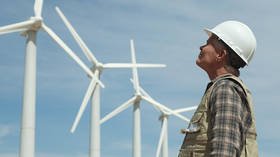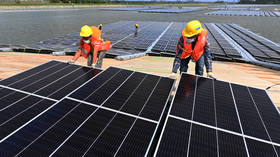We cannot afford to stop and start society depending on whether or not the wind may blow

Europe’s desperation to reach net zero, their religious devotion to renewables like wind and solar power, and their unscientific rejection of nuclear power are a recipe for an incredibly expensive disaster.
Energy prices have been rocketing in the past few weeks. While some of that rise is down to the world economy waking up from a lockdown-induced slumber, alarm bells are ringing about the way major Western economies have become too dependent on renewables in the mad dash to a ‘net-zero’ world.
The Wall Street Journal reported earlier this week that low winds in the North Sea were creating a major headache for energy networks. “The sudden slowdown in wind-driven electricity production off the coast of the UK in recent weeks whipsawed through regional energy markets. Gas and coal-fired electricity plants were called in to make up the shortfall from wind.”
Also on rt.com Would personal carbon allowances make eco-austerity fairer – or are they just another way government would micromanage our lives?For all the cheerleading – and huge subsidies – for renewables in recent years, they are a nightmare for a modern society where energy is required 24/7. The wind has been blowing less than usual this year. As one energy consultant explained to the Financial Times last week: “It is normal to see some seasonality in the wind generation but this summer the generation is even lower than previous years – it’s all related to the summer we have been having across Europe where it has been warm and dry and less windy.”
The drive to make society carbon-neutral has left us at the mercy of the elements – the exact opposite of human progress. Moreover, as Germany’s energy policy demonstrates, we are actually in a double bind, because we not only have periods of too little wind but also times when there is too much.
As fans of renewable energy like to crow, Europe has been getting a bigger and bigger share of electricity production from wind power. A recent article in Foreign Policy declares: “For Germany, 2020 was a banner year in the production of renewable energy. Clean energy sources – wind farms and solar arrays as well as hydroelectric and biogas plants – ratcheted their share of power consumption up to 46%, nearly equaling that of coal, gas, oil, and nuclear power combined.”
But what happens when the wind is blowing, but we don’t need that much power at the time? As the Foreign Policy article notes: “Stormy days can be so windy that the power flows from wind parks on- and offshore overwhelm the power grid, even triggering its collapse. These electricity tsunamis can threaten the stability of neighboring countries’ energy systems, a brickbat the Poles and Czechs wield. Moreover, when there’s excess power in the grid, prices can go negative, forcing grid operators to pay customers to take the electricity.” Instead of selling electricity, German power producers are forced to pay users to take that power. This is the economics of madness.
It gets worse. The Energiewende (‘energy transition’), outlined by the German government in September 2010, is a policy of shifting to low-carbon energy sources. However, six months after it was announced, the Fukushima nuclear accident led to the government also deciding to close down Germany’s nuclear-power plants, leaving the plan dependent on renewables.
As a feature article in Der Spiegel in 2019 revealed, the result has been enormously expensive. In the previous five years, the Energiewende cost Germany €32 billion per year. One estimate quoted in the article put the total cost of increasing German wind and solar output fivefold at €3.4 trillion.
The dash to erect ever more wind turbines, the authors noted, was provoking a backlash from those living both in the shadow of these huge machines and those having to tolerate ever more cables and pylons spreading across the countryside. “The politicians fear citizen resistance. There is hardly a wind energy project that is not fought.”
Is all this spending leading to lower emissions? Not at all. In fact, Germany’s emissions have flatlined because by getting rid of nuclear power, something else has to be in place to fill in the gaps when the wind doesn’t blow. That something else has been – wait for it – coal. So dependent has Germany become on the dirtiest of fossil fuels that the government announced last year it will only be able to phase coal out in 2038.
It’s one thing to add renewables to the electricity grid. When the wind is blowing at just the right speed and if there is just the right amount of demand, environmentalists can boast that electricity production is ‘carbon free’. But when demand is too high, those fossil-fueled gas and coal plants must be fired up, at great expense because the plant owners need to cover their costs while selling power for shorter periods. And when demand is too low, power is dumped on the network, which also costs money to manage.
Also on rt.com For once, I agree with Greenpeace: carbon offsets are a global con jobWind and solar power simply can’t reliably and economically power a modern economy. One way around the problem is to burn wood (possibly even worse for emissions than coal) and claim that it is low-carbon and renewable because you then plant more trees that suck up carbon from the atmosphere. Even the UK government’s eco-watchdog, the Committee on Climate Change, doesn’t believe that, demanding in 2018 that large-scale biomass plants should be avoided unless accompanied by carbon capture and storage.
Germany is one of the wealthiest countries in the world. But even eco-friendly Germans are starting to realize that current low-carbon technology – nuclear aside – is too expensive and unreliable. If carbon-cutting policies are maintained in the face of such a fundamental problem, the result will be an expensive disaster.
Like this story? Share it with a friend!
The statements, views and opinions expressed in this column are solely those of the author and do not necessarily represent those of RT.















